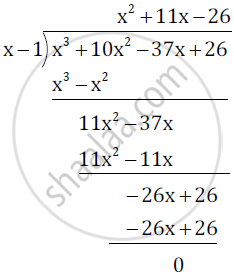Advertisements
Advertisements
प्रश्न
Using the Remainder and Factor Theorem, factorise the following polynomial:
`x^3 + 10x^2 - 37x + 26`
उत्तर
`f(x) = x^3 + 10x^2 - 37x + 26`
For x = 1
`f(1) = (1)^2 + 10(1)^2 - 37(1) + 26`
= 1 + 10 - 37 + 26
= 0
=> (x - 1) is a factor of `x^3 + 10x^2 - 37x + 26`
Now

Thus by factor theorem
`=> x^3 + 10x^2 - 37x + 26 = (x - 1)(x^2 + 11x - 26)`
`= (x - 1) (x^2 + 13x - 2x - 26)`
`= (x - 1)(x(x + 13) - 2(x + 13))`
`=> x^3 + 10x^2 - 37x + 26 = (x - 1)(x + 13)(x - 2)`
APPEARS IN
संबंधित प्रश्न
Find the remainder when x3 + 3x2 + 3x + 1 is divided by x.
Using the Remainder Theorem, factorise the following completely:
3x3 + 2x2 – 19x + 6
Use the Remainder Theorem to find which of the following is a factor of 2x3 + 3x2 – 5x – 6.
x + 2
The polynomials 2x3 – 7x2 + ax – 6 and x3 – 8x2 + (2a + 1)x – 16 leaves the same remainder when divided by x – 2. Find the value of ‘a’.
Using the Remainder Theorem, factorise the following completely:
4x3 + 7x2 – 36x – 63
The polynomials ax3 + 3x2 – 3 and 2x3 – 5x + a, when divided by x – 4, leave the same remainder in each case. Find the value of a.
Find the number which should be added to x2 + x + 3 so that the resulting polynomial is completely divisible by (x + 3).
Using the Remainder Theorem find the remainders obtained when ` x^3 + (kx + 8 ) x + k ` is divided by x + 1 and x - 2 .
Hence find k if the sum of the two remainders is 1.
Divide the first polynomial by the second polynomial and find the remainder using remainder theorem.
(54m3 + 18m2 − 27m + 5) ; (m − 3)
Find the values of a and b when the polynomial f(x)= ax3 + 3x2 +bx -3 is exactly divisible by (2x+3) and leaves a remainder -3 when divided by (x+2).
